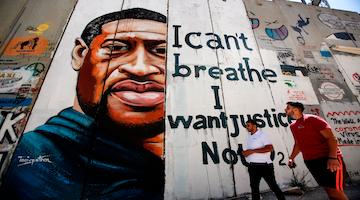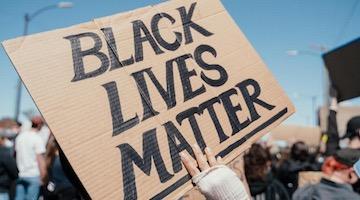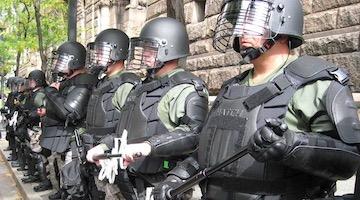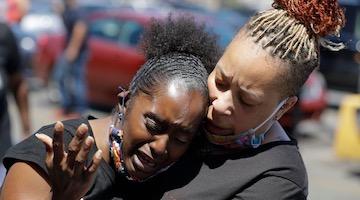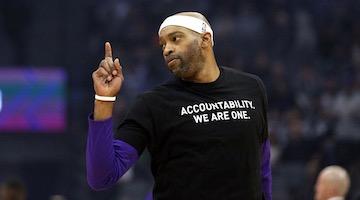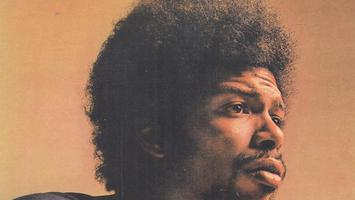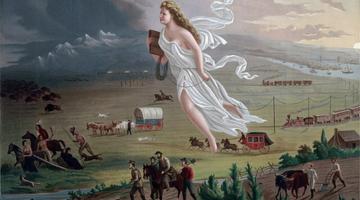Does the belatedness and ubiquity/banality of allyship echo an anxiety about the enormous restraint that African Americans have exercised?
“What is the difference between a yard sign that says BLM and a yard sign that says ‘Assata is welcome here?”
Earlier last month, Mark and Patricia McCloskey were about to dine al fresco on the “east patio” of their palatial St. Louis home when they spotted a BLM protest en route to Mayor Lyda Krewson’s residence. The white midwestern boomers rushed to deputize themselves and in the process, staged a new American Gothic. Images of the barefoot couple, shirts soiled with moutarde and brandishing an automatic rifle and pistol, respectively, quickly went viral. Mark McCloskey defended his actions to a local news outlet, “I really thought it was storming the Bastille. We would be dead and the house would be burned and there’s nothing we could do about it. It was a huge and frightening crowd and they broke in the gate. And they were coming at us.” As he sees it, they were fighting for their lives, “The only thing that stopped the crowd was my rifle.”
The images of the McCloskeys circulating in the news and on social media seem to be at odds with the another sort of performance by mostly, but not only, white homeowners: the outpouring of support for BLM in the form of yard and window signs, banners, chalk art, murals – even crochet doilies -- each affirming, “Black Lives Matter” and a number voicing the growing movement demand to defund the police. But to what extent is this display of allyship in the wake of uprisings in Minneapolis, Atlanta, St. Louis, Louisville, Chicago, New York and elsewhere, also striking a defensive posture?
The McCloskeys dramatically summon up what João Costa Vargas and Jaime Amparo Alves argue is one of the constitutive aspects of modern democracy in this hemisphere: the spectre of Haiti (Vargas and Alves 2020). Vargas and Alves contend that this collective dreadof Black revolt and autonomous rule, originating in the colonial project of chattel slavery, continues to animate social and political life throughout the diaspora. While perhaps counterintuitive to some, might it make sense then, to think about the rise in support for the Black Lives Matter Movement along these same lines? Could the recent surge in nonblack allyship signal a related, if implicit, fear of Black insurgency?
“To what extent is this display of allyship also striking a defensive posture?”
In the 1960s during the groundswell of urban uprisings and calls for Black Power, the threat of Black revolt was explicitly deployed by Civil Rights strategists to mobilize whites and galvanize their support for reform. For instance, James Baldwin issued the canonical ultimatum to “the relatively conscious whites and the relatively conscious blacks” who he believed held the power to raise white consciousness and facilitate a national reckoning with antiblack racism: “If we do not now dare everything, the fulfilment of that prophecy, re-created from the Bible in song by a slave, is upon us: God gave Noah the rainbow sign, No more water, the fire next time!”
Like The Fire Next Time, Martin Luther King Jr.’s final book Where Do We Go From Here also grappled with the growing appeal of political violence and nationalism to Black communities across the country. He argued that, “social justice and progress are the absolute guarantors of riot prevention. There is no other answer. Constructive social change will bring certain tranquility; evasions will merely encourage turmoil.” In other words, King contended that unless whites began to demand legislative reform, the country would grow exceedingly vulnerable in what was now a time of global revolt against oppression: “We still have a choice today: nonviolent coexistence or violent coannihilation. This may well be mankind’s last chance to choose between chaos or community.”
Black Nationalists, like Malcolm X, broadcast similar warnings, “it isn’t that time is running out -- time has run out!” As the 1964 presidential election neared he felt the white establishment had but two choices: “It’ll be the ballot or the bullet. It’ll be liberty or it’ll be death.” That is, if the United States and its institutions are not serving the interests of black people, then it’s within their rights to either create their own that do, and/or destroy the existing infrastructure.
“No more water, the fire next time!”
In the wake of this country’s most recent uprisings, the Pew Research Center announced that according to their latest poll, “most Americans express support for the Black Lives Matter Movement” and that more and more white and nonblack people of color are attending the protests. A Kaiser Foundation poll found that 74% of Americans believe that “police violence against the public” is a problem. One interpretation of these trends seems to be that whites are experiencing an unprecedented degree of state violence (at demonstrations), state failure (the covid 19 crisis), precarity and preventable death (neoliberalism has driven addiction and suicide rates among whites). Commentators hypothesize that whites are perhaps increasingly sensitized to the plight of Black folks and more willing to join what they see as a kind of class-based struggle.
I’m making another conjecture. If, as historian Kellie Carter Jackson writes, “Riots have a way of magnifying not merely flaws in the system but also the strength of those in opposition” (Carter Jackson 2019, 11, emphasis added) does the belatedness and ubiquity/banality of allyship echo an anxiety about the enormous restraint that African Americans have exercised during the course of what Saidiya Hartman calls the afterlife of slavery?
Take for example the endless e-mail announcements from brands and institutions professing their unwavering commitment to Black lives. Are these corporate communiques striking a defensive posture somewhat evocative of the “soul brother” signs that black businesses would put up in the 1960s hoping to be spared by so-called looters?
One window in my neighborhood in Austin, Texas holds two cardboard signs, “Black Lives Matter” and “Nazis followed orders” -- expressing a sense of the genocidal violence targeting Black communities, and perhaps, an awareness of their own complicity in the Black Holocaust. Similarly, there are signs with the slogan Silence=Violence. White friends of mine who live in Greater Austin, painted a BLM mural on their garage that reads in part, “Silence = Consent.” Another neighbor has spray painted BLM on a large white sheet that hangs from their balcony. As I tried to take a picture of the latest banner, a breeze blew the white butcher paper, calling to mind the universal flag for surrender. And then there’s the electric sign affixed to a tree that originally sprang up during the onset of the global pandemic with the lyrics of Robert McGerrin’s song, “Don’t Worry, Be Happy.” Post-uprisings, it’s been transformed into the message, “Don’t Worry BLM.” Just who is this meant to pacify?
“Are these corporate communiques striking a defensive posture somewhat evocative of the “soul brother” signs that black businesses would put up in the 1960s?
To be sure, the act of wielding an AR-15 at Black organizers and their allies is a far cry from a company making a large donation to a nonprofit or a nonblack household painting a #BLM mural on their fence. Yet whether or not these businesses and my neighbors ever deputize themselves like the McCloskeys (with arms or by dialing 911) they share a belief that the police are a necessary social institution. They are not calling for abolition. Instead they are calling for recognition (BLM), reform (at best: “defund the police” “defund apd,” “demilitarize the police,” “vote antiracist”), and reconciliation (image of black and white hands clasped, “all we need is love”). Ultimately, there is a kind of shared political will here that deserves greater scrutiny.
As the passages of Baldwin, King and Malcolm X allude to, there is a longstanding black radical tradition that theorizes the diasporic condition as war or enslavement and responds accordingly. Consider the activism of Assata Shakur, a member of the Black Liberation Army, which committed armed attacks against the state, carried out armed bank expropriations and worked towards building the Republic of New Afrika, a Black country made up of the former confederate states. As a result of these freedom dreams Shakur and her comrades were hunted by law enforcement agencies and white citizens alike. In 1967 Shakur was captured and sentenced to life in prison by an all-white jury. After six and half years in prison, she escaped and lived for a time underground, during which the FBI circulated wanted posters of her throughout the New York-New Jersey area. In response, Shakur’s supporters placed posters in their windows stating, “Assata is welcome here.”
I’m wondering about the difference between these two moments, these two demonstrations of allegiance. What is the difference between a yard sign that says BLM and a yard sign that says Assata is welcome here? Put another way, how does the desire for recognition, reform and reconciliation square with the dream of revolution? What is the relationship between these aesthetic displays of empathy and Black movements that long for the overthrowal of the United States? What is the truth of our political desire?
To condemn the McCloskeys as the worst of white folks, to borrow Kiese Laymon’s expression, and disavow our own possible collusion with the state’s political calculus -- that no extent of suffering ever warrants rebellion (James 2013) -- is to fundamentally misunderstand the capaciousness of antiblackness.
Kathryn Bedecarré holds a PhD in African Diaspora Studies from the University of Texas at Austin and teaches Black Studies at The University of Texas at San Antonio.
COMMENTS?
Please join the conversation on Black Agenda Report's Facebook page at http://facebook.com/blackagendareport
Or, you can comment by emailing us at comments@blackagendareport.com




